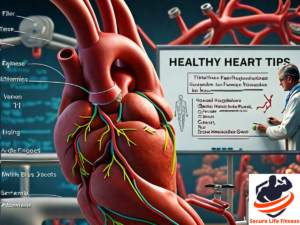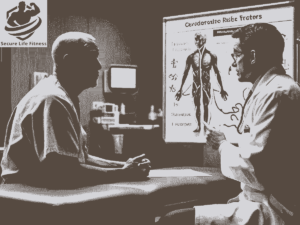Table of Contents
ToggleRisk Factors
Cardiovascular disease (CVD) is a leading cause of morbidity and mortality worldwide, accounting for over 17.9 million deaths per year. The good news is that many cases of CVD can be prevented by identifying and managing risk factors. In this blog post, we will explore the major cardiovascular risk factors, how to identify them, and most importantly, how to manage them.
Major Cardiovascular Risk Factors
Modifiable Risk Factors
These are risk factors that can be changed or managed:
High Blood Pressure
Blood pressure over 140/90 mmHg is the definition.
- May result in blood vessel damage, heart failure, and stroke
- Managed through lifestyle changes (diet, exercise, stress management) and medication
High Cholesterol
- Defined as total cholesterol ≥ 240 mg/dL
- May cause artery-clogging plaque to accumulate, raising the risk of heart attack and stroke
- Managed through diet, exercise, and medication
Diabetes
- Defined as blood sugar at fasting ≥ 126 mg/dL.
- Can lead to damage to blood vessels and nerves, increasing the risk of heart disease and stroke
- Managed through lifestyle changes (diet, exercise) and medication
Obesity
Body mass index (BMI) above 30 is the definition.
- May raise the chance of diabetes, high blood pressure, and high cholesterol.
- Managed through diet and exercise
Smoking
- A significant risk factor for cardiovascular disease
- May cause blood vessel damage and raise the risk of a heart attack or stroke.
- Managed through smoking cessation programs and support
Physical Inactivity
- The chance of developing cardiovascular disease might rise with a sedentary lifestyle.
- Managed through regular physical activity and exercise
Non-Modifiable Risk Factors
These are risk factors that cannot be changed:
Age
- Risk of cardiovascular disease increases with age
- Men ≥ 45 years and women ≥ 55 years are at higher risk
Gender
- Compared to women, men are more likely to get cardiovascular disease.
- However, women are at higher risk after menopause
Family History
- An individual’s risk may be elevated if there is a family history of cardiovascular disease.
Race
- Certain races (e.g., African Americans, Hispanics) are at higher risk of cardiovascular disease

Identifying Cardiovascular Risk Factors
Identifying cardiovascular risk factors is crucial in preventing and managing cardiovascular disease. Here are a few methods for locating them:
Medical History: Share your medical history with your doctor, including any previous heart conditions or surgeries.
- Physical Exam: Regular physical exams can help identify risk factors such as high blood pressure, high cholesterol, and obesity.
- Blood Tests: Blood tests can help identify risk factors such as high cholesterol and diabetes.
- Lifestyle Assessment: Share your lifestyle habits with your doctor, including your diet, physical activity level, and smoking status.
Managing Cardiovascular Risk Factors
Managing cardiovascular risk factors requires a multi-faceted approach. Here are some ways to manage them:
Lifestyle Changes
- Healthy Diet: Follow a heart-healthy diet that is rich in fruits, vegetables, whole grains, and lean protein sources.
- Regular activity: Perform moderate-intensity aerobic activity for at least 150 minutes per week.
- Stress Management: Take part in stress-relieving techniques like yoga, meditation, or deep breathing.
- Smoking Cessation: Quit smoking and avoid exposure to secondhand smoke.
Medications
- Blood Pressure Medications: Take medications as prescribed by your doctor to manage high blood pressure.
- Cholesterol-Lowering Medications: Take medications as prescribed by your doctor to manage high cholesterol.
- Diabetes Medications: Take medications as prescribed by your doctor to manage diabetes.
Alternative Therapies
- Acupuncture: May help lower blood pressure and improve overall cardiovascular health.
- Omega-3 Fatty Acids: May help lower triglycerides and reduce inflammation.
- Coenzyme Q10: May help improve energy production in the heart and reduce oxidative stress.
The Importance of Early Detection
Early detection of cardiovascular risk factors is crucial in preventing and managing cardiovascular disease. Many risk factors, such as high blood pressure and high cholesterol, do not have symptoms until they have caused significant damage. Consequently, it’s imperative that you see your doctor on a frequent basis.
The Role of Diet in Cardiovascular Health
Diet plays a significant role in cardiovascular health. A heart-healthy diet can help lower cholesterol levels, blood pressure, and body weight, all of which are major risk factors for cardiovascular disease. A heart-healthy diet includes:
- Plenty of fruits and vegetables
- Whole grains and legumes
- Lean protein sources, such chicken and fish
- Low-fat dairy products
- Nuts and avocados, which contain healthy fats
The Benefits of Exercise in Cardiovascular Health
Regular exercise is essential for cardiovascular health. Exercise can help:
- Lower blood pressure
- Improve blood flow to the heart
- A rise in HDL cholesterol, or high-density lipoprotein, the “good” cholesterol
- Reduce stress and anxiety
- Improve overall physical fitness
The Impact of Stress on Cardiovascular Health
Stress can have a significant impact on cardiovascular health. Chronic stress can increase blood pressure, heart rate, and cardiac output, all of which can put extra strain on the heart. To assist manage stress, take up stress-relieving hobbies like yoga, meditation, or deep breathing techniques.
The Role of Sleep in Cardiovascular Health
For general health, especially cardiovascular health, sleep is crucial. Chronic sleep deprivation can increase the risk of cardiovascular disease, including high blood pressure, heart attack, and stroke. Aim for 7-8 hours of sleep per night.
Social Support’s Significance for Cardiovascular Health
Social support from family, friends, and community can play a significant role in cardiovascular health. Social support can help:
- Reduce stress and anxiety
- Improve mental health
- Increase motivation to make healthy lifestyle changes
- Provide emotional support during difficult times
Conclusion
Cardiovascular disease is a leading cause of morbidity and mortality worldwide, but many cases can be prevented by identifying and managing risk factors. By understanding the major cardiovascular risk factors and how to identify and manage them, individuals can take control of their heart health and reduce their risk of cardiovascular disease. Remember, it’s never too early or too late to make a change and improve your heart health.













